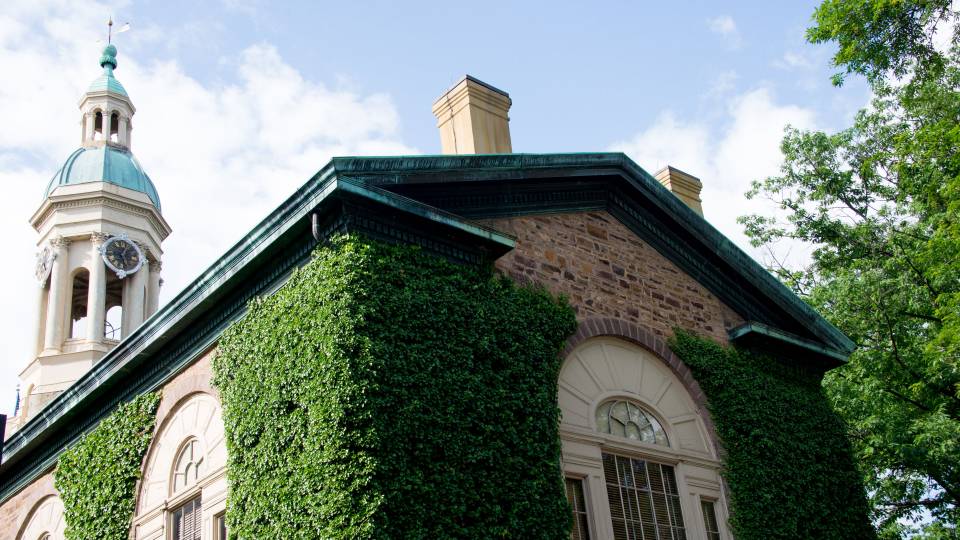Austin Newton spent his entire academic career at Princeton, first in the biology department and biochemical sciences program, then as a founding member of the Department of Molecular Biology. During this time, he established a new experimental system and mentored many generations of undergraduates, graduate students and postdoctoral fellows. He died May 13 in Princeton at age 85.

Austin Newton
"Austin's work on the cell biology of Caulobacter was groundbreaking," said Lynn Enquist, Princeton's Henry L. Hillman Professor in Molecular Biology, Emeritus, who chaired the department from 2004 to 2013. "He was a pioneer in molecular biology."
Born in Richmond, Texas, Newton graduated from the University of Texas-Austin in 1959 and received a Ph.D. in biochemistry from the University of California-Berkeley in 1964, then joined the group headed by Nobel Laureate Jacques Monod at the Pasteur Institute in Paris. Newton pursued his postdoctoral studies during a time that has been called the "golden age of molecular biology." He showed how an outstanding puzzle in gene regulation could be solved by the clever utilization of simple genetic tools. In Paris, he also discovered an abiding passion for sub-Saharan and West African sculpture and textiles.
At Princeton, where he was appointed an assistant professor in 1966, he published several classic papers of fundamental importance to understanding coordinated gene translation. He soon realized, however, that molecular biology was moving on, and that the genetic approaches with which he was familiar could be applied to fundamental problems in developmental biology. This became the major focus of his research at Princeton.
Newton was promoted to associate professor in 1973 and to full professor in 1978. He retired in 2009. In addition to his teaching and research at Princeton, supported by competitive awards from the National Institutes of Health and the National Science Foundation, he served on the editorial board of the Journal of Bacteriology and as associate editor of Developmental Genetics. He was a member of various scientific societies and a fellow of the American Academy of Microbiology.
Newton pioneered a new field, using genetic and molecular analyses to study the origins of asymmetric cell division — a characteristic of stem cells and cancer stem cells but also one that distinguishes Caulobacter, a tiny freshwater bacterium. Newton and his group made groundbreaking discoveries on the mechanisms governing asymmetric cell division, cell polarity, cell cycle organization and the conversion of cells from one morphology to another.
"His contributions to our understanding of how cell polarity changes are linked to cell cycle progression were truly pioneering," said Myriam Heiman, who completed her undergraduate thesis with Newton in 1998 and is now the Latham Family Career Development Associate Professor of Neuroscience at the Massachusetts Institute of Technology and a core member of the Broad Institute of MIT and Harvard. "I feel honored to have had the opportunity to work in his group, even if for a short period of time."
Colleagues say Newton’s research was marked by vision and scientific imagination, traits that characterized his interactions with students and colleagues as well as his life in general. Many of his students have gone on to leading scientific roles in graduate and medical school departments or distinguished careers in biomedical industries. Students credit him with teaching them how to identify and tackle scientific problems.
Newton is remembered as a connoisseur who successfully mixed his broad interests in science, music (piano and Bach were favorites), art (especially African art), travel and good wine. Together with his long-time collaborator and wife, Noriko Ohta, one of Princeton's first female Ph.D. graduates, Newton shared a full and exciting life, welcoming a generation of students, postdocs, faculty and friends from around the world.
"When I first joined the department almost 30 years ago, Austin contacted me immediately to offer his help in purchasing a house and showing me around Princeton," Enquist recalled. "Even though I was in another building, he stopped by regularly to help me negotiate the various issues of setting up my lab. He had a wry sense of humor and a passion for music and art."
His is survived by Ohta and his sister Margueritte Dell Newton of Texas.
View or share comments on a blog intended to honor Newton's life and legacy.


